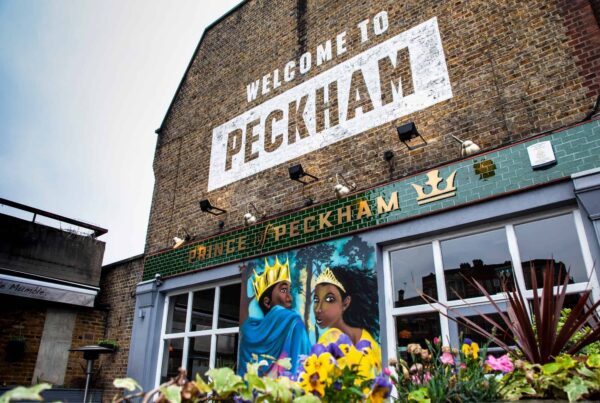If everyone in the world had the same lifestyle as we do in the UK, we’d need 2.6 Earths to support us. Just let that sink in: 2.6 whole Earths.
Every one of us has a responsibility to live sustainably and protect the world around us. In 2022, it’s more important than ever that we all do what we can to become more sustainable and mitigate the impacts of climate change.
However, there’s a lot of confusion about what we can actually do to be more environmentally sustainable. Should we go completely vegan, ditch the car forever, and never touch plastic again? In an ideal world, yes, but that’s simply not realistic for most people. Living the “perfect” eco-friendly lifestyle can be expensive, difficult, and out of reach for many individuals.
However, we’re firm believers that perfection is overrated. You don’t have to be the perfect eco warrior to make a difference in the world; even small switches can help reduce your ecological footprint and fight the impacts of climate change.
That’s why we’ve written this article to discuss some of the realistic and easy switches you can make to boost your sustainability and reduce your carbon footprint. Are you ready to start living more sustainably?
What exactly is sustainability?
Sustainability means “meeting our own needs without compromising the ability of future generations to meet their own needs.”
There are three pillars of sustainability: environmental, social, and economic.
Environmental Protection
Our interactions are only sustainable if they don’t end up destroying the environment and the further natural resources we require to function. This form of protection requires us looking in detail at how we use our resources and ensuring that we minimise the negative effects and behaviour that positively impacts the environment is maximised.
Social Development
Our well-being and the longevity of society is a part of the mix of what sustainability stands for. Ensuring that people have access to basic resources, that their health is being protected and that they enjoy a good quality life within a sustainable environment is critical, even more so as time goes on. People only tend to express interest in topics which they are educated about and understand, therefore carrying on the discussion past school education is essential.
Economic Development
Sustainability without economic development simply cannot succeed. In order to encourage individuals, communities and businesses to invest in more sustainable resources, there must be an incentive; of which further extends the long-term advantages that sustainability brings.
Now that we’ve explained the background to sustainability, here are some quick and easy tips to become more environmentally savvy in your day-to-day life.
Reduce, Reuse, Recycle
You’ve probably heard the phrase ‘reduce, reuse, recycle’ a million times, but it truly is important. One thing that many people forget is that the phrase lists these strategies in order of importance:
1. Reduce
Reducing your consumption is the most important way to be more sustainable. Before buying something, ask yourself: do I really need this?
Cutting down on fast fashion is especially important. The average British person throws away around 3.1kg of textiles each year and the UK is the fourth largest textile waste producer in Europe.
We love this idea from Deonna Anderson, Whitney Bauck, Terry Nguyen, & Maddie Stone published in Grist:
“What if we treated clothes shopping more like getting a new tattoo? […] We should imagine every clothing item purchased, for ourselves or someone else, as essentially a permanent decision — because a thrown-away t-shirt is not really going “away.” It’s worth investing in clothes that, like a good tattoo, will both be loved to death by their owners and have staying power (in both style and quality) so that they can be happily worn for years.”
2. Reuse
The reuse part of the maxim covers many things, from trying to buy second-hand items (such as pre-loved clothes or second-hand furniture), to reusing the things you already own as much as possible. For example, instead of buying fancy new storage containers to use in the kitchen, consider instead opting for the reusable ones you received from your last takeaway, or reusing glass bottles of pasta sauce to store homemade sauces or ingredients.
Moreover, if you have belongings that you don’t need and would otherwise go to landfill, consider gifting them to someone who needs them or donating them to charity. This extends the lifespan of your items and reduces the number of things going to landfill.
If you’re buying new items, try to make sure that they are reusable and will last you a long time. For example, always opt for the reusable shopping bag instead of the cheaper ones that break after a single use — it’s more environmentally beneficial and will save you money in the long run!
3. Recycle
Finally, if you can’t reduce or reuse, make sure that you are recycling where possible. Recycling reduces the volume of stuff going to landfill, saves energy, water, and other natural resources, and causes less pollution than simply throwing something away.
However, make sure that you are recycling correctly in line with your local area’s rules. You can’t throw just anything in the recycling bin; recycle your electronic appliances and batteries using dedicated places.
Remembering to reduce, reuse, recycle is an easy first step towards living sustainably that anyone can do!
Make your garden wildlife-friendly
If you have outdoor space, why not take steps to make it more friendly to local wildlife. Consider ditching the neatly-mowed lawn and let it grow out to welcome insects such as butterflies. Welcome bee-friendly plants into your garden such as lavender — these will also make your garden look and smell glorious!
Other wildlife-friendly ideas include:
- Build an insect hotel with rocks, twigs, and rotting wood
- Create a compost heap to encourage insects and animals (only add raw food waste – cooked food waste in your compost will attract rats)
- Stop weeding — daisies, buttercups and nettles are a great food source for butterflies and moths
- Install bird boxes
Making your garden more welcoming to wildlife is super easy and a great way to be more planet-friendly. Even if your outdoor space is limited to a small balcony or patio, don’t despair — adding a few wildlife friendly plants can make a huge difference!
Avoid plastic as much as possible
Another easy way to be more sustainable is to avoid plastic. Pick fruits and vegetables from the supermarket that do not come in layers of plastic packaging and opt for a reusable bag instead of a plastic one.
If you’re really committed to living a more sustainable lifestyle and going plastic-free, you may consider using your local refill or zero waste shop where you can take your own containers and fill them up with items like pasta, rice, beans, washing up liquid, and more.
You can also opt for plastic-free and eco-friendly products such as cosmetics and cleaning products that are better for the environment. For example, try using a bar of soap instead of one that comes in a plastic bottle, or choose dishwasher tablets that come in eco-friendly packaging.
Eat fewer animal products
With livestock estimated to be responsible for up to 14% of carbon emissions caused by humans, it’s no surprise that climate scientists are urging people to eat less meat.
Reducing your consumption of animal products is a really easy way to bring down your personal emissions footprint. Not only is it cheaper to buy less meat, but it also can introduce you to an amazing new world of vegetarian and vegan dishes.
Of course, you don’t need to become a hardcore vegan to become more eco-friendly. If the thought of cutting down your meat and dairy intake terrifies you, consider going meat-free for just one or two days a week. Or, try writer and activist Jonathan Safran Foer’s technique: avoiding eating animal products before dinner.
Switch to energy-saving lightbulbs
This is one of the quickest and easiest tips on this list: swap out your light bulbs for LED alternatives. Not only are these brighter and longer-lasting than traditional lightbulbs, but they also typically use 75% less energy.
And don’t forget to turn out the lights when you’re not using them!
Use public transportation or cycle instead of driving
Another way to reduce your emissions is to opt for a more eco-friendly form of transport by cycling, taking the bus, or catching the train instead of driving.
Research has found that walking or cycling instead of driving just one day a week can make a big difference to our carbon footprints.
Or, if driving is absolutely necessary, consider switching to an electric car or more energy-efficient vehicle.
Use renewable and green energy sources at home
Okay, this tip is a little more time consuming and expensive, but it’s absolutely worth it.
If you want to reduce emissions from greenhouse gases, consider reducing your home’s reliance on non-renewable energy sources. For example, you might decide to install solar panels or use heat pumps to reduce your home’s carbon footprint and bring down energy bills in the process.
Make your workplace eco-friendly
There’s no reason your sustainable switches should be limited to the home — consider petitioning your employer to make your workplace eco-friendly too. For example, you might ask for bike storage to encourage cycling to work, start a campaign for your office to go paperless, or organise a clothes swap where people in your workplace can exchange clothes that they no longer want.
Other ways to make your workplace more sustainable include:
- Assess your suppliers to ensure that they have good eco credentials, or switch to more sustainable sources
- Set targets for reducing your workplace’s carbon footprint
- Reduce energy use in the workplace by remembering to switch off lights, electronic appliances, and air conditioning when not in use
Conclusion: the reality of sustainability
Real, long-lasting change is only possible when the world’s biggest players (governments, energy companies, and corporations) are forced to take action to become greener. We all have a responsibility to vote for politicians who care about sustainability and support businesses that are making a positive environmental impact.
Nevertheless, making small sustainable switches in your daily life is also important. No matter how small and powerless you may feel, your actions do make a difference.
Are you an individual or business with an eco-friendly mission? Naked Truth is a PR agency with a focus on businesses that create real social impact. We amplify the voices of our clients through the power of PR, helping them achieve their missions and make the world a better place.
Interested in how we can help your voice get heard? Get in touch today.





